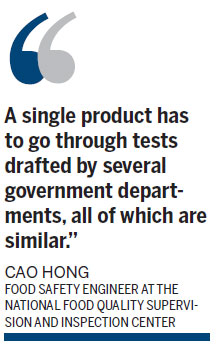The country's top health authority wants to scrap or combine more than 1,400 food standards over the next two years to streamline food safety rules, an official said on Thursday.
A National Health and Family Planning Commission survey last year of the 4,934 food standards found that 1,492 of them contradicted others or were redundant. Merging or scrapping them altogether would be preferable, said Su Zhi, director of the commission's food safety standard and supervision evaluation department.
"Some standards overlapped," he said at a news conference on Thursday.
Su said the authority will finish merging redundant standards over the next two years as part of an effort to build a better national food safety standard system.
Cao Hong, a food safety engineer at the National Food Quality Supervision and Inspection Center, said the high number of food standards has long troubled food producers and certification agencies.
"A single product has to go through tests drafted by several government departments, all of which are similar," she said.
The mountain of standards regulating bottled water caused a legal battle last year between Nongfu Spring, one of China's bottled-water giants, and Beijing Times. The publication printed a series of reports blaming the bottled water producer of only adopting Zhejiang province's standards instead of using national standards.

Nongfu Spring denied the allegation, insisting that the national standard is compulsory for all bottled water producers. It filed a defamation suit against Beijing Times in November.
The China National Center for Food Safety Risk Assessment, which is responsible for analyzing and merging standards, said in May that it will work quickly to consolidate current bottled-water standards.
Cao said a lack of coordination between different government departments is one of the main reasons for the high number of food standards.
"Different government departments have their own committee for drafting standards to only cover the areas under the departments' jurisdictions," she said.
Some food standards have also failed to keep up with technological developments.
"Some standards require outdated test methods. Some test hazardous elements, such as mercury and chromium, one by one. But it is now possible to test for all of these elements at one time," she said.
Su, director of the commission's food safety standard and supervision evaluation department, said the biggest hurdle the authority faces in combining food standards is risk assessment, which requires long-term data.
Su said the country will step up its research on the risk assessment of existing food standards over the next two years.
xuwei@chinadaily.com.cn
(China Daily 01/17/2014 page3)
